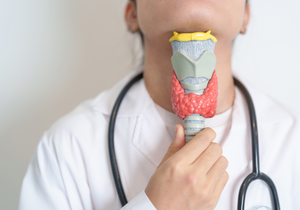Thyroid Function Tests: What You Need to Know Before Visiting the Best Thyroid Hospital
Body
Thyroid function tests are vital diagnostic tools used to evaluate thyroid health and detect any irregularities in thyroid hormone levels. If you plan to visit the best thyroid hospital in Ghaziabad for a thyroid checkup, understanding these tests is crucial. In this post, we will offer detailed information about thyroid function tests to ensure you are well-prepared before you visit this cost-effective multispeciality hospital, known for its excellence in thyroid care and complete body checkups.
Understanding Thyroid Function: The thyroid gland produces hormones that regulate metabolism, energy levels, and various bodily functions. Thyroid function tests gauge the levels of thyroid hormones in the blood, offering valuable insights into thyroid health. The key thyroid hormones tested are thyroxine (T4) and triiodothyronine (T3), along with thyroid-stimulating hormone (TSH) produced by the pituitary gland to regulate thyroid hormone production.
Types of Thyroid Function Tests:
TSH Test: Measures the level of thyroid-stimulating hormone in the blood. Elevated TSH levels may indicate an underactive thyroid (hypothyroidism), while low levels may suggest an overactive thyroid (hyperthyroidism).
T4 Test: Assesses the level of thyroxine in the blood. High T4 levels may indicate hyperthyroidism, while low levels may indicate hypothyroidism.
T3 Test: Evaluates the level of triiodothyronine in the blood. Elevated T3 levels may indicate hyperthyroidism, while low levels may suggest hypothyroidism.
Thyroid Antibody Tests: These tests measure antibody levels attacking the thyroid gland, such as thyroid peroxidase antibodies (TPOAb) and thyroglobulin antibodies (TgAb). Elevated levels may indicate autoimmune thyroid disorders like Hashimoto's thyroiditis or Graves' disease.
Preparing for Thyroid Function Tests: Before visiting the best thyroid hospital in Ghaziabad for these tests, follow these important steps:
Inform your healthcare provider about any medications you're taking, as certain medications can impact thyroid hormone levels.
Follow any fasting instructions provided by your healthcare provider, as some tests may require fasting before the blood draw.
Avoid excessive iodine intake before the tests, as it can interfere with the results.
Interpreting Thyroid Function Test Results: Results are typically interpreted based on reference ranges provided by the laboratory. The best thyroid hospital in Ghaziabad. will analyze your results and explain their significance. Here's a general guide to interpreting the results:
TSH Levels:
Normal: 0.4 to 4.0 milliunits per liter (mU/L)
Low (<0.4 mU/L): Hyperthyroidism
High (>4.0 mU/L): Hypothyroidism
T4 Levels:
Normal: 4.5 to 11.2 micrograms per deciliter (μg/dL)
High: Hyperthyroidism
Low: Hypothyroidism
T3 Levels:
Normal: 80 to 200 nanograms per deciliter (ng/dL)
High: Hyperthyroidism
Low: Hypothyroidism
Thyroid Antibody Levels:
Elevated levels: Autoimmune thyroid disorders (Hashimoto's thyroiditis, Graves' disease)
Consulting with Thyroid Specialists: After receiving your results, consult with specialists at the top thyroid hospital in Ghaziabad. They will interpret your results, diagnose any disorders, and recommend suitable treatment options based on your needs.
Treatment Options for Thyroid Disorders: Treatment varies based on the diagnosis and severity, including:
Medications: Thyroid hormone replacement therapy (levothyroxine) for hypothyroidism, antithyroid medications (methimazole, propylthiouracil) for hyperthyroidism.
Radioactive iodine therapy: Destroys thyroid tissue to treat hyperthyroidism.
Surgery: Thyroidectomy for thyroid cancer or severe disorders.
Conclusion: Thyroid function tests are crucial for assessing thyroid health and detecting disorders. Before visiting the best thyroid hospital in Ghaziabad for these tests, understand the types of tests, preparation steps, and result interpretation. By following these guidelines and consulting with specialists, you can ensure optimal thyroid health. This cost-effective multispeciality hospital in Ghaziabad offers comprehensive care and expertise in thyroid health for both thyroid and full body checkups.










Comments